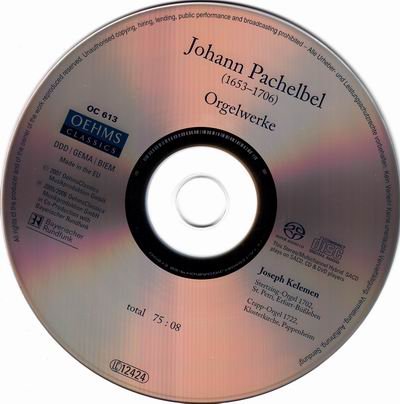
Joseph Kelemen - Johann Pachelbel: Suddeutsche Orgelmeister, Vol. 3 (2007) [SACD]
BAND/ARTIST: Joseph Kelemen
- Title: Johann Pachelbel: Suddeutsche Orgelmeister, Vol. 3
- Year Of Release: 2007
- Label: OEHMS - OC 613
- Genre: Classical
- Quality: DSD64 image (*.iso) / 2.0, 5.0 (2,8 MHz/1 Bit)
- Total Time: 73:19
- Total Size: 3.56 GB
- WebSite: Album Preview
Tracklist:
1. Praeludium d minor - 5:42
2. Wir glauben all an einen Gott - 4:10
3. Ciacona f minor (transposed to d minor) - 7:06
4. Magnificat octavi toni (1) - 0:40
5. Magnificat octavi toni (2) - 1:07
6. Magnificat octavi toni (3) - 1:05
7. Magnificat octavi toni (4) - 1:01
8. Magnificat octavi toni (5) - 1:07
9. Magnificat octavi toni (6) - 0:27
10. Ricercar C major - 3:55
11. Toccata C major - 2:17
12. Ricercar c minor - 5:50
13. Fuga d minor - 3:09
14. Toccata c minor - 3:06
15. Fuga c major - 2:26
16. Was Gott tut, das ist wohlgetan (1) - 0:55
17. Was Gott tut, das ist wohlgetan (2) - 0:49
18. Was Gott tut, das ist wohlgetan (3) - 0:48
19. Was Gott tut, das ist wohlgetan (4) - 0:51
20. Was Gott tut, das ist wohlgetan (5) - 1:15
21. Was Gott tut, das ist wohlgetan (6) - 0:55
22. Was Gott tut, das ist wohlgetan (7) - 0:56
23. Was Gott tut, das ist wohlgetan (8) - 0:55
24. Was Gott tut, das ist wohlgetan (9) - 0:43
25. Was Gott tut, das ist wohlgetan (10) - 1:07
26. Herr Christ der einig Gotts Sohn - 3:50
27. Nun lob mein Seel den Herren - 2:18
28. Vom Himmel hoch da komm ich her (transposed to C major) - 1:28
29. Aria tertia (1) - 1:01
30. Aria tertia (2) - 1:08
31. Aria tertia (3) - 1:04
32. Aria tertia (4) - 0:54
33. Aria tertia (5) - 0:58
34. Aria tertia (6) - 0:53
35. Aria tertia (7) - 1:05
36. Jesus Christus, unser Heiland, der von uns den Gotteszorn wandt - 3:11
37. Wie schön leuchtet der Morgenstern - 2:55
38. Toccata C major - 1:49
![Joseph Kelemen - Johann Pachelbel: Suddeutsche Orgelmeister, Vol. 3 (2007) [SACD]](https://www.dibpic.com/uploads/posts/2021-05/1622121335_back.jpg)

1. Praeludium d minor - 5:42
2. Wir glauben all an einen Gott - 4:10
3. Ciacona f minor (transposed to d minor) - 7:06
4. Magnificat octavi toni (1) - 0:40
5. Magnificat octavi toni (2) - 1:07
6. Magnificat octavi toni (3) - 1:05
7. Magnificat octavi toni (4) - 1:01
8. Magnificat octavi toni (5) - 1:07
9. Magnificat octavi toni (6) - 0:27
10. Ricercar C major - 3:55
11. Toccata C major - 2:17
12. Ricercar c minor - 5:50
13. Fuga d minor - 3:09
14. Toccata c minor - 3:06
15. Fuga c major - 2:26
16. Was Gott tut, das ist wohlgetan (1) - 0:55
17. Was Gott tut, das ist wohlgetan (2) - 0:49
18. Was Gott tut, das ist wohlgetan (3) - 0:48
19. Was Gott tut, das ist wohlgetan (4) - 0:51
20. Was Gott tut, das ist wohlgetan (5) - 1:15
21. Was Gott tut, das ist wohlgetan (6) - 0:55
22. Was Gott tut, das ist wohlgetan (7) - 0:56
23. Was Gott tut, das ist wohlgetan (8) - 0:55
24. Was Gott tut, das ist wohlgetan (9) - 0:43
25. Was Gott tut, das ist wohlgetan (10) - 1:07
26. Herr Christ der einig Gotts Sohn - 3:50
27. Nun lob mein Seel den Herren - 2:18
28. Vom Himmel hoch da komm ich her (transposed to C major) - 1:28
29. Aria tertia (1) - 1:01
30. Aria tertia (2) - 1:08
31. Aria tertia (3) - 1:04
32. Aria tertia (4) - 0:54
33. Aria tertia (5) - 0:58
34. Aria tertia (6) - 0:53
35. Aria tertia (7) - 1:05
36. Jesus Christus, unser Heiland, der von uns den Gotteszorn wandt - 3:11
37. Wie schön leuchtet der Morgenstern - 2:55
38. Toccata C major - 1:49
In the Southern and Northern German Organ Schools, Johann Pachelbel has a special status. Although the Nuremberg-born composer probably never set foot in Northern Germany, some of his works are very Northern German in style. He was also a friend of Johann Ambrosius Bach, Johann Sebastian Bach’s father, as well as the teacher of the latter’s oldest son Johann Christoph. In addition, Johann Pachelbel is said to have studied the Southern German organ style with Johann Casper Kerll from 1673–75 in Vienna. Joseph Kelemen has chosen two instruments for this recording: the St. Petri organ in Erfurt-Büßleben, built by G.Ch. Stertzing in 1702, and the Crapp organ in Pappenheim from 1720, which is still in exemplary original condition. The instruments have different types of intonation: the Stertzing organ in Büßleben is still conservative mean tone, as was frequently the case around 1700, while the Pappenheim Crapp organ with its original well-tempered intonation points toward the future.
![Joseph Kelemen - Johann Pachelbel: Suddeutsche Orgelmeister, Vol. 3 (2007) [SACD]](https://www.dibpic.com/uploads/posts/2021-05/1622121335_back.jpg)

As a ISRA.CLOUD's PREMIUM member you will have the following benefits:
- Unlimited high speed downloads
- Download directly without waiting time
- Unlimited parallel downloads
- Support for download accelerators
- No advertising
- Resume broken downloads


![Joseph Kelemen - Johann Pachelbel: Suddeutsche Orgelmeister, Vol. 3 (2007) [SACD]](https://www.dibpic.com/uploads/posts/2021-05/1622121284_front.jpg)